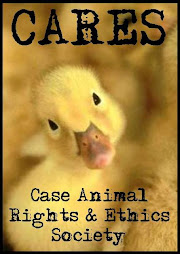March 22, 2008
Dogs on the Case Campus ... Progress!
February 11, 2008
Opening Dialogue about Animal Experimentation
 Panel speakers will include: Dr. Marty Pagel (Head of the Institutional Animal Care and Use Committee -IACUC), Dr. Kathy Hessler (Law School Animal Law professor), Dr. Richard Drushel (Vertebrate Anatomy professor), Dr. Sara Waller (Philosophy and Animal Cognition professor), and Carolyn Yane (A.B.D. in Neurochemistry, animal advocate).
Panel speakers will include: Dr. Marty Pagel (Head of the Institutional Animal Care and Use Committee -IACUC), Dr. Kathy Hessler (Law School Animal Law professor), Dr. Richard Drushel (Vertebrate Anatomy professor), Dr. Sara Waller (Philosophy and Animal Cognition professor), and Carolyn Yane (A.B.D. in Neurochemistry, animal advocate).- Please join us for invigorating discussion and a chance to express your own views on this topic. *Free Cookies and Drinks will be provided*
December 21, 2007
something missing on campus

Do You Miss Dogs?
Just four years ago…
Dogs Were Welcome on the CWRU campus. Many faculty brought their dogs to work, to athletic events, and the presence of their fuzzy friends brightened the spirit of countless students.
Then, in 2003…
Mans Best Friend was BANNED from campus. Dogs are no longer even permitted to walk through the quad.
Want DOGS back on campus?
· Take the DOGS ON CAMPUS survey!
· Sign the Dog Policy petition!
December 20, 2007
touched by a beagles eyes

As a leading research University, Case Western strives to uphold ethical standards and to assure that the research supported by the university is justified and performed in the most humane way possible.
All research proposals at Case are carefully evaluated and scrutinized by the Case IACUC (Institutional Animal Care & Use Committee) to assure that the research is conducted according to protocol. The IACUC "is responsible for reviewing all protocols involving live vertebrate animals, ensuring compliance with federal regulations, inspecting animal facilities and laboratories and overseeing training and educational programs. The overall role of the IACUC is to ensure the humane and sensitive care and use of animals. "
I believe it is very important that we, as members of the Case community, learn about the kinds of research we support here at Case. I, for one, have many questions.
What kind of animals are being tested on at Case? (Dogs, pigs, mice, rats...) What types of experiments are conducted? Is the research classified as "pain class E" (the most severe level of pain inflicted on the test subjects) necessary and justified? Do the benefits of the research outweigh the costs? You can find answers to these questions by attending an Institutional Animal Care and Use Committee (IACUC) meeting.
The first IACUC meeting I attended was an eye-opener as it revealed specific examples of research performed on animals here at Case. The IACUC meetings are open to the public, and I strongly urge everyone to attend one.
December 19, 2007

"SAFE began with a simple conversation in a veterinarian’s office, between family law attorney Leslie Gentile and her veterinarian, James Prueter, DVM. Leslie was saddened and frustrated by a recent case in which a client had left her home because of domestic violence. Unfortunately, the abuser had taken out his anger on the woman’s animal, who had been left behind. The telling of this story—and the venting of Leslie’s sadness and frustration—planted the seeds for the founding of Safety for Animals and Families in Emergencies (SAFE).
As the two friends conversed, they acknowledged some sad truths about a growing problem. They talked about the fact that many women who need to leave their homes (often in a hurry) don’t have the kind of support system that includes family and friends who can (or will) care for a pet. They discussed the lack of facilities to house animals in domestic violence shelters. Finally, they expressed their disdain at the knowledge that animals often become pawns in the cycle of domestic violence, with abusers threatening—and frequently carrying out—acts of abuse against beloved pets in order to intimidate and control the people who love them. "
Dr. Prueter has been an inspiration to myself and many others, proving that with enough attention, effort, and persistence, it is possible for individuals to effect change in even the most difficult situations. No one individual can end animal suffering or stop human violence, but never underestimate the impact that one person alone can have on many lifes.
To learn more about SAFE visit: http://safe.cuyahogacounty.us/
Speak up for those without a voice-- you may just save a life.




